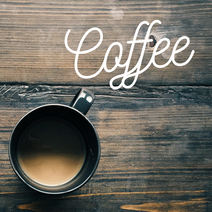 Coffee is one of those things - you either love it or hate it. You know if you like the taste or not (or if it’s just a reason to drink sugar and cream). You know how it makes you feel (i.e. your gut, your mind, etc.). Not to mention the crazy headlines that say coffee is great, and the next day you should avoid it! There is actual science behind why different people react differently to it. It's a matter of your genetics and how much coffee you're used to drinking. NOTE: Coffee does not equal caffeine. Coffee contains between 50-400 mg of caffeine/cup, averaging around 100 mg/cup. Coffee is one of the most popular ways to consume this stimulant. But… a cup of coffee contains a lot of things over and above the caffeine. Not just water, but antioxidants, and hundreds of other compounds. These are the reasons drinking a cup of coffee is not the same as taking a caffeine pill. And decaffeinated coffee has a lot less caffeine; but, it still contains some. Let's look at caffeine metabolism, its effects on the mind and body, and whether coffee drinkers have higher or lower risks of disease. Then I’ll give you some things to consider when deciding if coffee is for you or not. Caffeine metabolism Not all people metabolize caffeine at the same speed. How fast you metabolize caffeine will impact how you’re affected by the caffeine. In fact, caffeine metabolism can be up to 40x faster in some people than others. About half of us are “slow” metabolizers of caffeine. We can get jitters, heart palpitations, and feel "wired" for up to 9 hours after having a coffee. The other half is "fast" metabolizers of caffeine. They get energy and increased alertness and are back to normal a few hours later. This is part of the reason those headlines contradict each other so much - because we’re all different! The effects of coffee (and caffeine) on the mind and body NOTE: Most studies look at caffeinated coffee, not decaf. The effects of coffee (and caffeine) on the mind and body also differ between people; this is partly from the metabolism I mentioned. But it also has to do with your body’s amazing ability to adapt (read: become more tolerant) to long-term caffeine use. Many people who start drinking coffee feel the effects a lot more than people who have coffee every day. So, while some of these effects are good and some aren’t, you need to see how they affect you and decide if it’s worth it or not. Coffee and health risks There are a ton of studies on the health effects of coffee, and whether coffee drinkers are more or less likely to get certain conditions. Here’s a quick summary of what coffee can lead to:
Many of the health benefits exist even for decaf coffee (except the caffeine addiction and sleep issues). NOTE: What’s super-important to note here is that coffee intake is just one of many, many factors that can affect your risks for these diseases. Please never think regular coffee intake is the one thing that can help you overcome these risks. You are health-conscious and know that eating a nutrient-rich whole foods diet, reducing stress, and getting enough sleep and exercise are all critical things to consider for your disease risk. It’s not just about the coffee. Should you drink coffee or not? There are a few things to consider when deciding whether you should drink coffee. No one food or drink will make or break your long-term health. Caffeinated coffee is not recommended for:
Depending on how your body reacts, decide whether these reactions are worth it to you. If you’re not sure, I recommend eliminating it for a while and see the difference. Recipe (Latte): Pumpkin Spice Latte Serves 1 3 tbsp coconut milk 1 ½ tsp pumpkin pie spice (or cinnamon) ¼ tsp vanilla extract 1 tbsp pumpkin puree ½ tsp maple syrup (optional) 1 cup coffee (decaf if preferred) Instructions Add all ingredients to blender and blend until creamy. Serve & enjoy! Tip: You can use tea instead of milk if you prefer. References: https://authoritynutrition.com/coffee-good-or-bad/ http://www.precisionnutrition.com/all-about-coffee http://www.health.harvard.edu/staying-healthy/a-wake-up-call-on-coffee http://www.health.harvard.edu/blog/can-your-coffee-habit-help-you-live-longer-201601068938 http://suppversity.blogspot.ca/2014/05/caffeine-resistance-genetic.html https://authoritynutrition.com/how-much-coffee-should-you-drink/
0 Comments
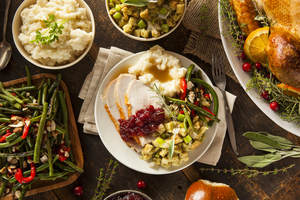 Sometimes those holiday feasts are just amazing. And it's not just the abundance of delicious food but also the people, the decorations, and the ambiance. It is way too easy (and common) to indulge on those days. But it doesn't always stop there. Sometimes we overeat on regular days. Or at regular meals. Or All. The. Time. Here are three tips to avoid overeating at meals. Tip #1: Start with some water When your stomach is growling and you smell amazingly delicious food it's too easy to fill a plate (or grab some samples with your bare hands) and dive into the food. But did you know that it's possible to sometimes confuse the feeling of thirst with that of hunger? Your stomach may actually be craving a big glass of water rather than a feast. Some studies have shown that drinking a glass or two of water before a meal can help reduce the amount of food eaten. And this super-simple tip may even help with weight loss (...just sayin'). Not only will the water start to fill up your stomach before you get to the buffet, leaving less room for the feast but drinking enough water has been shown to slightly increase your metabolism. Win-win! Tip #2: Try eating “mindfully” You've heard of mindfulness but have you applied that to your eating habits? This can totally help you avoid overeating as well as having the added bonus of helping your digestion. Just as being mindful when you meditate helps to focus your attention on your breathing and the present moment being mindful when you eat helps to focus your attention on your meal. Do this by taking smaller bites, eating more slowly, chewing more thoroughly, and savoring every mouthful. Notice and appreciate the smell, taste and texture. Breathe. This can help prevent overeating because eating slower often means eating less. When you eat quickly you can easily overeat because it takes about 20 minutes for your brain to know that your stomach is full. So take your time, pay attention to your food and enjoy every bite. Bonus points: Eat at a table (not in front of the screen), off of a small plate, and put your fork down between bites. Tip #3: Start with the salad You may be yearning for that rich, creamy main dish. But don't start there. (Don't worry, you can have some...just after you've eaten your salad). Veggies are a great way to start any meal because they're full of not only vitamins, minerals, antioxidants, and health-promoting phytochemicals but they also have some secret satiety weapons: fiber and water. Fiber and water are known to help fill you up and make you feel fuller. They're “satiating”. And these secret weapons are great to have on your side when you're about to indulge in a large meal. Summary: Have your glass of water, eat mindfully, and start with your salad to help avoid overeating at meals. Recipe (Water): Tasty (and beautiful) Pre-Meal Water Ideas If you're not much of a plain water drinker or need your water to be more appealing to your senses here are five delicious (and beautiful looking) fruit combos to add to your large glass of water:
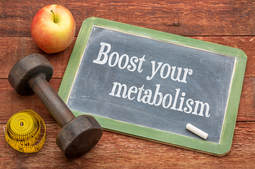 What is Metabolism? This word “metabolism” is thrown around a lot these days. You know that if yours is too slow you might gain weight. But what exactly does this all mean? Well technically “metabolism” is the word to describe all of the biochemical reactions in your body. It's how you take in nutrients and oxygen and use them to fuel everything you do. Your body has an incredible ability to grow, heal, and generally stay alive. And without this amazing biochemistry you would not be possible. Metabolism includes how the cells in your body:
Which brings us to the “metabolic rate”. Metabolic rate This is how fast your metabolism works and is measured in calories (yup, those calories!). The calories you eat can go to one of three places:
As you can imagine the more calories you burn as work or creating heat the easier it is to lose weight and keep it off because there will be fewer “leftover” calories to store for later. There are a couple of different ways to measure metabolic rate. One is the “resting metabolic rate” (RMR) which is how much energy your body uses when you're not being physically active. The other is the “total daily energy expenditure” (TDEE) which measures both the resting metabolic rate as well as the energy used for “work” (e.g. exercise) throughout a 24-hour period. What affects your metabolic rate? In a nutshell: a lot! The first thing you may think of is your thyroid. This gland at the front of your throat releases hormones to tell your body to “speed up” your metabolism. Of course, the more thyroid hormone there is the faster things will work and the more calories you'll burn. But that's not the only thing that affects your metabolic rate. How much you weigh you are counts too! People with higher body weight, have higher metabolic rates; but your body composition is crucial! As you can imagine muscles that actively move and do work need more energy than fat does. So the more lean muscle mass you have the more energy your body will burn and the higher your metabolic rate will be. Even when you're not working out. This is exactly why weight training is often recommended as a part of a weight loss program. Because you want muscles to be burning those calories for you. The thing is, when people lose weight their metabolic rate often slows down which you don't want to happen. So you definitely want to offset that with more muscle mass. Aerobic exercise also temporarily increases your metabolic rate. Your muscles are burning fuel to move so they're doing “work”. The type of food you eat also affects your metabolic rate! Your body actually burns calories to absorb, digest, and metabolize your food. This is called the “thermic effect of food” (TEF). You can use it to your advantage when you understand how your body metabolizes foods differently. Fats, for example increase your TEF by 0-3%; carbs increase it by 5-10%, and protein increases it by 15-30%. By trading some of your fat or carbs for lean protein you can slightly increase your metabolic rate. Another bonus of protein is that your muscles need it to grow. By working them out and feeding them what they need they will help you to lose weight and keep it off. And don't forget the mind-body connection. There is plenty of research that shows the influence that things like stress and sleep have on the metabolic rate. This is just the tip of the iceberg when it comes to metabolism and how so many different things can work to increase (or decrease) your metabolic rate. Recipe (Lean Protein): Lemon Herb Roasted Chicken Breasts Serves 4 2 lemons, sliced 1 tablespoon rosemary 1 tablespoon thyme 2 cloves garlic, thinly sliced 4 chicken breasts (boneless, skinless) dash salt & pepper 1 tablespoon extra virgin olive old Preheat oven to 425F. Layer ½ of the lemon slices on the bottom of a baking dish. Sprinkle with ½ of the herbs and ½ of the sliced garlic. Place the chicken breasts on top and sprinkle salt & pepper. Place remaining lemon, herbs and garlic on top of the chicken. Drizzle with olive oil. Cover with a lid or foil. Bake for 45 minutes until chicken is cooked through. If you want the chicken to be a bit more “roasty” then remove the lid/foil and broil for another few minutes (watching carefully not to burn it). Serve & enjoy! Tip: You can add a leftover sliced chicken breast to your salad for lunch the next day! References: http://www.precisionnutrition.com/all-about-energy-balance https://authoritynutrition.com/10-ways-to-boost-metabolism/ 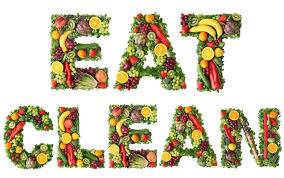 No really, it actually is. I did a YouTube video on this a while back entitled, I hate Clean Eating, and I said just kidding I don’t really hate it, I just hate the term. And here are my reasons why:
BTW, my grandmother in law (GG) turned 99 years old today and I can guarantee you the only time she eats organic is over at my house. She lives alone in her own house and has a better memory than I do. She used to walk 5 miles every day, she has always been lean, she eats’ McDonalds a couple of times of month. She clear’s her plate at every meal. She eats veggies and fruits, and pizza’s and pies. She eats everything in moderation. So instead of focusing on “clean eating” lets focus on moderation. Lean proteins, fruits, veggies, and whole grains. But let’s also eat that pizza and ice cream, I don’t want to live in a world where I can’t enjoy pizza with my kids and I certainly don’t want them feeling bad or making others feel bad about their food choices! Have you ever been on a diet and felt like you were kicking ass and taking names? Then a couple of weeks in you have a disastrous day. Your spouse is traveling, your kids are sick, the car breaks down, and the A.C. breaks on a 90 degree day, and so on..... You know the kind of day I am talking about? The kind of day that only Ben and Jerry can help you with.
Those days are the worst and if you’re dieting the last thing you want to do is sit down to another dinner of grilled chicken and green beans. So you hit the ice-cream or cake or chips, maybe even a big glass of wine. You feel some satisfaction, you deserve some happiness after the shit day you had. Right? You probably think this is where I am going to say, “Wrong, get your shit together”. But I am not, you are right, you had a bad fucking day, honestly what’s the point if you can’t enjoy some ice-cream after cleaning kid puke all day or shelling out more money to fix your car. Now there is a caveat, you can’t run to the freezer every time something bad happens but if you do relapse on your diet once in a while it’s okay. You are human, I am human, and tomorrow is another day. Here are some tips to get you through a diet relapse:
Whether you’re a first time Mom or you just had your 4th, making fitness a priority is usually the last thing on your mind. I waited a year before I started working out after my 1st child. It wasn’t until I saw a picture of myself from his one year old birthday party and thought, “oh shit, I need to work out”. If you have had that “oh shit” moment, then I am here to help. Whether it was not recognizing yourself in a picture or the fact that your toddler can out sprint you in the park, we have all been there.
Now, where do you get started? Do you buy a gym membership and throw that kid in gym daycare or do you work out at home during nap time? We are lucky enough to live an age where we have a lot options to make our health a priority. I’m going to outline a step by step guide to “working on my fitness, who’s my witness” throwback to Fergie, love her! Step 1: Tell your partner you are starting a new routine. Then tell them, if you love me, you will support me every step of the way. I’m serious, before I hired an online trainer, which at the time was something completely new to me. I told my husband, I need to get 4 workouts in a week, so you need to help me make this a priority. BTW, he did, because he rocks. And as a result, he joined a CrossFit and making sure he had time to get to classes was a new priority for me. Step 2: Focus on small goals not a big ones. Instead of saying I want to lose 40lbs, set small goals that will eventually lead to that big goal. For example: Month one: I will eat veggies at every meal I will go out for a mile walk with the baby 3 times per week Month two: I will focus on getting a 100 grams of protein every day I will start strength training 1 day per week along with my walks Month three: I will start tracking my protein, carbs, and fats and eat in a calorie deficit I will start strength training two days per week along with my walks Step 3: Give yourself a reward for hitting your small goals. Did you hit all of your goals for week one? If so reward yourself with a pedicure or new workout tank. Hit all of your goals for month one, buy some new sneakers! It’s so easy to buy the kids new cloths and forget about ourselves, give yourself a treat for a change! Step 4: Don’t label one food as good or bad. A lot of times we feel guilty for eating things like cake or cookies and not eating “clean”. Food is food and we shouldn’t feel guilty for enjoying things that taste good to us. Food can be about celebrations and culture, not just nourishing our bodies for optimal health. Not eating pasta, a food your family’s culture and traditions have been based on because some celebrity fitness guru said carbs are bad and not clean is just crazy. One person can have the ability to make you feel bad about something that is a part of your soul. And that’s wrong. Well, I am the person to tell you, eat the dam the pasta! Step 5: Find physical activities that you enjoy. This may take some trial and error but it’s worth it. Don’t be a runner because you think cardio is the only way to get and stay lean, it’s not, and it’s not even as effective as other activities like strength training. Okay so those are my steps and remember, take it easy on yourself. The biggest mistake people make when trying lose fat or get in shape is going too hard to fast. You set these goals for yourself that just aren’t achievable when we’re trying to do things like, oh I don’t know, raise a human, take care of our homes, work, the list goes on. As mothers we put way too much pressure on ourselves to do it all. Make taking care of your body a positive thing, not a stressful thing. Remember your body created life and that’s pretty amazing! Do you want to lose fat? I can show you how with these 5 simple tips. You can start losing fat right now and get in the best shape of your life. 1. EAT MORE PROTEIN Yes you heard me right, I want you to eat more. I want you to take your weight and multiply it by .9, for example 145 pounds times .9 equals 130. That is the number of grams of protein you should be eating per day no matter what. And by protein, I mean lean protein like chicken breast, ground turkey, fish, and lean beef. Protein will keep you fuller longer. Having a meal of just pasta is not going to keep you as full as having a piece of chicken, some veggies, and a smaller serving of that pasta. Not only are you consuming less calories than just having the bigger portion of pasta but you’re also getting micronutrients from the chicken and vegetables. By making these small changes, you have just reduced your caloric intake, increased the amount of beneficial micronutrients your body is getting and you will stay fuller longer, which leads to less snacking, which leads to an even bigger caloric deficit. 2. EAT CARBOHYDRATES AT NIGHT Has anyone ever told you to stop eating carbs at night and you will lose weight? Chances are they have and its bullshit. It doesn’t matter what time of day you eat carbs, as long as you’re eating in a calorie deficit you’re going to lose fat. If you are eating 150 gram of carbs per day, and you eat them all at breakfast and lunch and none at dinner you will lose the same amount of weight if you instead ate 50 grams at breakfast, 50 grams at lunch, and 50 grams at dinner. Eat carbs when you want to eat carbs. There are a lot of celebrity trainers out there who say you can’t eat carbs at night, even though the research doesn’t support that. The problem is ego, it’s tough for people to admit when their wrong, I get it, you get it, but just know this, if someone truly wants to help someone else they should have no problem admitting their wrong. And if someday the research supports that you shouldn’t eat carbs at night for fat loss, then I will come to your house say I am wrong and rip that sweet potato from your plate. Just kidding I won’t take the sweet potato :) 3. EAT FAT I want you to eat fat, but fat from whole sources like meat, avocado, and eggs, stop buying reduced fat Oreo’s, your body isn’t falling for it. You know what else your body isn’t falling for? Bulletproof coffee. Hey listen if you want to add 50 grams of fat to your coffee, do you. But just know you are now limited to what else you can eat during the day. And if you’re eating in a calorie deficit, the goal should be to feel as full and satisfied as possible while also still losing fat. 50 grams of fat is 450 calories, most women eating in a deficit are around 1,500 calories total for the day. If you want to spend a 1/3 of your calories on coffee, go for it, just know that you are either going to bed hungry or you will end up not eating in a deficit. But hey all that butter and toxin free coffee is going make you a happier person right? Don’t fall for the hype people, have some eggs, sausage and toast instead. 4. LIFT WEIGHTS Lifting weights does not make women look bulky. It is very hard to gain muscle and look “bulky and jacked”, women who do have that physic actually worked very hard to get it. So when someone says I don’t want to lift weights and look bulky like her, it’s actually insulting, because no woman accidently got muscles like that, you have to work for it. When you strength train and eat in a calorie deficit that is high in protein, the fat starts coming off faster than any 1,200 calorie diet and running on the treadmill will get you. And you might find that you actually enjoy strength training, seeing some muscle definition is a result of hard work. And if your goal is to look “toned”, lifting weights will get you there faster than running and doing a bunch of sit ups and pushups. Pushups are awesome by the way. The picture below is me, on the left I had been doing a popular commercial diet that seriously restricted my calories and foods. I was working out 6 days a week. I lost 10 pounds in 6 months. The picture on the right was another 10 pounds lost, but this time in 6 weeks. The difference was that no food was off limit and I worked out 4 days a week strength training on my own. Find what makes you happy, find what makes you want to get up and move. Try Salsa dancing, try CrossFit, try Barre, try it all until you find what sticks. 5. EAT AS MANY MEALS AS YOU WANT
I’m dead serious, it doesn’t matter how many meals a day you eat, as long as you’re eating the same number of calories and are in a deficit, you will lose fat. Eating 6 small meals a day does not make you a fat burning machine. If you don’t like to eat breakfast, don’t eat it, save those calories for a bigger lunch or dinner. Don’t need a snack, don’t worry, 3 meals a day is okay. Again, it’s the total number of calories that matter not the time of day. If you start implementing these changes in your life right now, I guarantee you will lose a pound a week until you hit your goal. If you have questions or want custom macros for FREE, just sign up on my home page, I will also send you my Recipe book for FREE. Yes I said FREE twice, PS I don’t sell shakes or supplements, I give out free content because I want to help people, not make a commission on some overpriced shake. And if you end up hiring me to be your coach, that’s cool too. Just know I am a certified personal trainer and a certified nutrition coach, I help people find what works for them not just what worked for me! I would love you for you to follow me on Instagram: nmguerrette and my Facebook page https://www.facebook.com/nergfitness/. We have all heard of Omega 3 and Omega 6 Fats, and a lot of you are probably even taking some supplements. But are you getting the right ratio of 3’s to 6’s?
If you are eating a diet high in trans fats, then you are already getting enough Omega 6 fats. Omega 6 fats are pro-inflammatory, which means you want to make sure you are getting enough Omega 3 fats, which are anti-inflammatory. In your everyday life you want to aim for a ratio of between 3 to 1 and 1 to 1, in order to have a balanced inflammatory profile. Most dietary fats come from the Omega-6 fats, so it’s important to include Omega-3 rich foods and supplements in your diet like, fish oil, flax seeds, and flax oil. Fish Oil is a very popular supplement to add to your diet. It’s important to add the right amount of EPA and DHA. The recommended intake is 900 mg of EPA and DHA per day, that’s 3 grams of fish oil. Of course, everyone is different so please consult with your physician first, they may have different recommendations based your health and any other medications you may be taking. Some benefits of fish oil are:
Have you ever wondered how to strengthen your immune system? In this blog post I am going to break it down for you.
It’s actually very simple, eat fruits, vegetables, lean protein, beans, nuts, and whole grains, stay hydrated, exercise and wash your hands. It’s not complicated, but like losing weight, everyone is looking for that quick fix. When it comes to exercise, over exercising can actually weaken your immune system, so you want to find a volume that your body can handle on a weekly basis that isn’t making you overly sore and/or affecting your sleep. Recovery drinks after exercise can also strengthen your immune system, the right amount protein and carbohydrates can improve your immune-competence. Nutrients and minerals also play a role in a strong immune system, hence the need to eat healthy diet consisting of whole foods. Vitamins associated with positive immunity:
Minerals associated with positive immunity:
I spotlight vitamins and minerals every week. Reference: International Sports Sciences Association 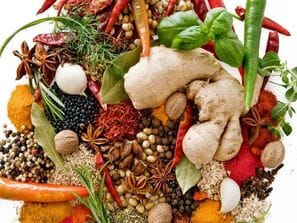 Have you ever noticed why some foods make you feel fuller and sustain your appetite longer? It’s all about nutrient density, getting the most of nutrients for the least amount of calories! And nutrient density is so important when you’re dieting. It can mean difference between going to bed hungry and miserable or going to bed feeling satisfied and losing fat. For example: 1.7 oz. bag of Doritos – 262 Calories Deli Turkey on wheat bread with lettuce, tomato, pickles, and yellow mustard – 250 calories These two food items are roughly the same amount of calories, however the turkey sandwich is going to hold you over far longer than the bag of Doritos. Why you say? Well the Doritos have 14 grams of fat, 3.5 grams of protein, and 29 grams of carbohydrates. The turkey sandwich is going to have less than 1 gram of fat, roughly the same of amount of carbohydrates, and 30 grams of protein. The difference is between the fat and protein. The fat is not nutrient dense, where the turkey (protein is). Also important to note is that 1 gram of fat is equal to 9 calories and 1 gram of protein is equal to 4 calories. You get more bang for your buck by loading up on protein. Does this mean you should stay away from fat? Absolutely not, you just need to stick with healthy fats like Omega 3’s. Salmon is one of the most nutrient dense foods out there. So when we make our food choices we should also be thinking about the nutrient density in those foods. And don’t be afraid of carbohydrates either. There are good and bad ones, that bagel is awfully tempting but save those carbs for a baked potato, the potato is one of the world’s most perfect foods, just don’t slice it up and fry it. Vegetables also pack a big bang for the buck. As I always say to my clients no one ever got fat eating too many Brussel sprouts! Here is a list of nutrient dense foods to keep you full during your diet! Black Beans Blueberries Broccoli Brussel Sprouts Cauliflower Kale Lean proteins Mushrooms Raspberries Salmon Spinach Strawberries Sweet Potatoes Tomatos Lean proteins |
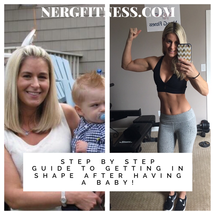
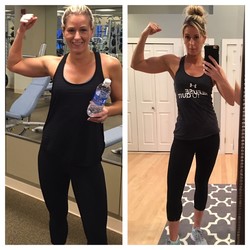
 RSS Feed
RSS Feed